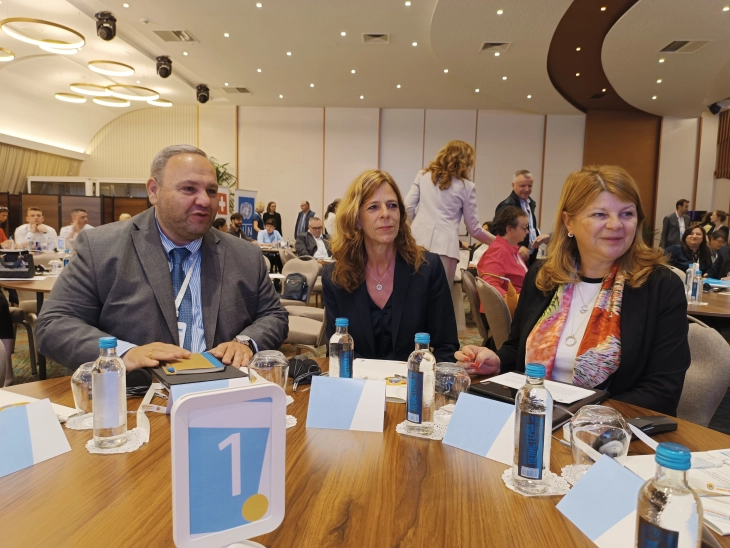Shukova: Women's role in environmental management enhances sustainability and inclusivity
- The two-day regional conference on Gender Equality and Disaster Risk Reduction (DRR) in the Western Balkans and Turkey, organised by UNDP, kicked off Tuesday in Skopje.
- Post By Silvana Kocovska
- 13:12, 21 May, 2024

Skopje, 21 May 2024 (MIA) – The two-day regional conference on Gender Equality and Disaster Risk Reduction (DRR) in the Western Balkans and Turkey, organised by UNDP, kicked off Tuesday in Skopje.
It aims to deepen the understanding of Disaster Risk Reduction (DRR) and Gender Equality in the Western Balkans and Turkey. The conference will highlight women’s leadership in disaster risk management and advocate for inclusive policies and collaboration among stakeholders.
Minister of Environment and Physical Planning Kaja Shukova delivering welcoming remarks at the conference said that we are at the intersection of societal development and climate change, and the role of women is crucial in shaping healthy and resilient communities.
"Governments and international bodies must ensure that women have a voice in policymaking," Shukova stressed.
She said that women's participation in leadership and decision-making is crucial.
“Studies show that when women are involved in environmental processes and management, outcomes are more sustainable and inclusive. Women contribute with a unique perspective, focusing on the well-being of the entire community. Education is also a key tool in empowering women to participate in shaping these policies,” she said.
Shukova added that economically empowered women can participate in decisions that are sustainable for nature, technology, and agriculture.

Véronique Hulmann, Ambassador of Switzerland to North Macedonia, noted that Polog is the region most vulnerable to climate change, which has faced many significant disasters in recent years. In 2015, infrastructure and many homes were destroyed.
She explained that Switzerland has requested UNDP to participate in this project and to introduce a comprehensive system for raising awareness, strengthening resilience, and managing natural disasters in the Polog region.
“The assessment conducted as part of the project shows that in such disaster-prone regions, more than 50 percent of households, men have decision-making power. Women are less represented in this decision-making. Minorities, as well as families with lower incomes, and so forth,” Hulmann added.
The project, she explained, has gender-responsive guidelines and recommends the involvement of women and vulnerable groups in shaping policies and response plans for natural disasters.
Hulmann underscored that Switzerland remains committed to increasing North Macedonia’s resilience to natural disasters and promoting equality through projects.

The Resident Representative of UNDP in the Republic of North Macedonia, Armen Grigoryan, stated that today they are present to remind of the frequency and catastrophic impact of natural disasters. He noted that their impact and frequency do not affect all people equally. Especially for women, vulnerable groups, and persons with disabilities, who are less protected, Grigoryan added.
“By fostering partnership, sharing knowledge and experiences, we will create a future with greater resilience for all. We must ensure that our policies meet the needs of all genders, all groups, and leave no one behind in reducing disaster risks," he noted.
According to Grigoryan, the project for the Polog region, supported by the Swiss Government, aims to strengthen capacities for disaster risk reduction and climate resilience for both men and women in the resilience network in the Polog region.
The Conference is organized within the project „Improving Resilience to Floods in the Polog Region“, financed by the Government of Switzerland; and with the support of the UNDP Regional Istanbul Hub as well as the financial support of the Government of Turkey.
Photo and video: MIA







